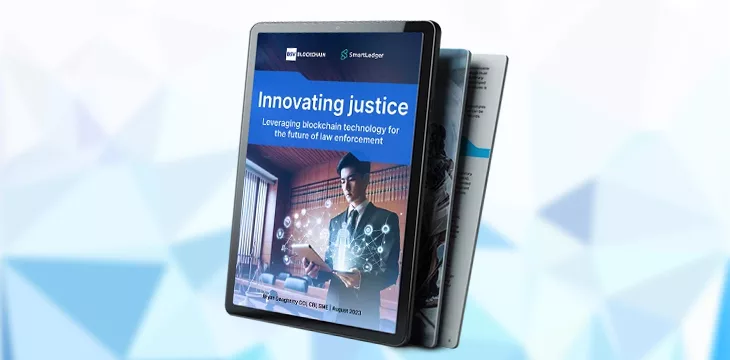Can blockchain help law enforcement while maintaining privacy and public trust? We share how in our new eBook.
Blockchain can help law enforcement and the judicial system drive digital transformation in broader society. We do this by increasing trust and transparency in an open, scalable network designed to drive efficiency and collaboration.
The BSV Association’s new e-book, titled “Justice Transformation: Leveraging Blockchain Technology for the Future of Law Enforcement,” authored by prominent advocate Bryan Daugherty, is a series that presents new use cases for another yet-to-be-released application of blockchain technology. This is the latest work. A fully explored field.
Those who think blockchain is about “evading justice” will not appreciate the title of the e-book. But it’s a sign of how the conversation around technology has matured over the past 15 years. Remember that a system that grants complete anonymity to individuals also gives that power to corrupt officials and organized crime. And if governments and law enforcement want greater transparency for ordinary individuals, the same conditions must apply to ordinary individuals as well.
Blockchain’s concept of a timestamped universal truth ledger makes this even more possible.
The BSV Association and SmartLedger have produced a suitably dramatic video to explain the basics.
As Daugherty notes in the introduction, “Transparency and accountability form the foundation of public trust in law enforcement.” New technologies have enhanced our ability to fight crime, but they have also created new complexities in processing vast amounts of data, communicating across jurisdictions, and privacy issues.
“These complexities apply not only to government agencies but also to the general public.”
The book is comprised of 15 easily digestible pages and covers seven key topics.
- Security and integrity of legal evidence
- Information exchange and collaboration
- Identity and Personal Data Management
- Automation, Accountability and Internal Governance
- Public Participation and Community Safety
- An innovative approach to law enforcement
- Integration of IPv6 and blockchain
Just as blockchain can track the progress of goods through commercial supply chains, immutable timestamp records can protect judicial proceedings. This includes crime scene evidence and forensic/fraud analysis, anonymous (yet verifiable) tips, signs of tampering, recording asset seizures, executing arrest warrants, and more, throughout court proceedings, including witness testimony and sentencing.
The open nature of the BSV blockchain allows greater access by different parties interested in resolving a case or verifying records, saving time in situations where such information may be critical. This applies across states and borders. Blockchain transactions and stored data are always encrypted, restricting access to only those who can view them.
Privacy advocates are right to balk at larger intrusions in the form of surveillance and biometric recordings. However, blockchain can secure these records as well as secure evidence, allowing verification of data integrity without revealing personal information. Anonymize information in situations where it is necessary, such as for witness protection and tracking the activities of individuals not directly involved in the case. These records also help prevent sensitive information from falling into the wrong hands, limiting opportunities for identity theft/fraud.
Additionally, as with supply chain monitoring, law enforcement can leverage other emerging technologies to disseminate information more quickly. This includes data collected from billions of IoT devices, artificial intelligence (AI) for predictive analytics, and IPv6 Internet communications (5G mobile or fixed).
For a blockchain to perform these tasks adequately, it must be scalable, fast, and inexpensive to use. As Daugherty writes, “Not all blockchains are created equal,” and to date, only BSV has demonstrated all three of these features while maintaining integrity with its superior proof-of-work (PoW) data processing algorithm.
Want to hear more about how blockchain achieves all of this? “Innovative Definition” is now available for free download from the BSV Blockchain Association website here.
Watch: Enhancing Data Privacy Using the Latest Encryption Technology – Owen Vaughan
Are you new to blockchain? To learn more about blockchain technology, check out CoinGeek’s Blockchain for Beginners section, our ultimate resource guide.



